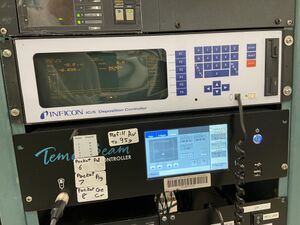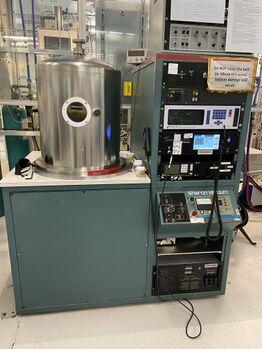E-Beam 1 (Sharon): Difference between revisions
Jump to navigation
Jump to search
Content deleted Content added
→Recipes: link to process control data |
|||
| (65 intermediate revisions by 9 users not shown) | |||
| Line 1: | Line 1: | ||
{{ |
{{tool2|{{PAGENAME}} |
||
|picture=e-beam1.jpg |
|picture=e-beam1.jpg |
||
|type = Vacuum Deposition |
|type = Vacuum Deposition |
||
|super= |
|super= Michael Barreraz |
||
|super2= Bill Millerski |
|||
|phone=(805)839-3918x210 |
|||
|phone=(805)839-7975 |
|||
|location=Bay 3 |
|location=Bay 3 |
||
|email= |
|email=mikebarreraz@ece.ucsb.edu |
||
|description = Four Pocket Electron Beam Evaporator |
|description = Four Pocket Electron Beam Evaporator |
||
|manufacturer = Sharon Vacuum Co., Inc. |
|manufacturer = Sharon Vacuum Co., Inc. |
||
|materials = |
|||
|toolid=7 |
|toolid=7 |
||
}} |
}} |
||
[[File:EBEAM1 Controls Sept2022.jpeg|thumb|EBeam#1 Deposition + Beam Controllers]] |
|||
= About = |
|||
=About= |
|||
The Sharon is a cryo-pumped thin film evaporator with a |
The Sharon is a cryo-pumped thin film evaporator with a Telemark 8 pocket electron beam evaporation source. Fixturing in EBeam1 will accept any size sample up to 4-inch diameter. In addition, a rotation fixture is easily installed which permits adjustable angle, 360° rotation of any size sample, up to 4-inch diameter. This feature is particularly useful for promoting step coverage of irregular surfaces. |
||
EBeam1 is used for the evaporation of high purity metals, e.a. Al, Au, Ni, Ge, AuGe, Ti, Pt etc., for interconnect and ohmic contact metallization for fabrication of III-V compound semiconductor and silicon device fabrication. |
|||
=Detailed Specifications= |
|||
*Cryopump: CTI Cryotorr 8F with air-cooled compressor |
|||
*Pumping speed: 4,000 l/sec. for H2O, 1,500 l/sec. for air, 2,200 l/sec. for H2, 200 l/sec. for Ar |
|||
*Mechanical Pump: Ebara EV-A10, 35 CFM |
|||
*Electron Beam Source: Temescal, Model STIH-270-2MB, four 15 cc hearths |
|||
*Electron Beam Power Supply: Temescal, Model CV-6SLX, 0 - 10 kV dc, 0–600 mA dc beam current; TemEBeam Sweep Control |
|||
*Deposition Control: : Inficon IC/5, 6 film programs; 37 parameters for automatic or manual deposition control based on a resonating quartz crystal sensor |
|||
*Pieces up to Four - 4" wafers in one run. |
|||
*For single wafers: tilt with motorized rotation and sample lowering for higher effective rates, sidewall coverage, angled evaporation. |
|||
=Documentation= |
|||
The Sharon is used for the evaporation of high purity metals, e.a. Al, Au, Ni, Ge, AuGe, Ti, Pt etc., for interconnect and ohmic contact metalization for fabrication of III-V compound semiconductor and silicon device fabrication. |
|||
*[https://wiki.nanofab.ucsb.edu/w/images/f/f0/EB-1_operation_instructions_6-6-24.pdf EBeam 1 Operating Procedure] |
|||
= Materials Table = |
|||
**Operating Instructions |
|||
**[https://wiki.nanofab.ucsb.edu/w/images/a/a1/EB1_Rotation_Fixture_SOP_5-16-25.pdf Rotation Fixture SOP] |
|||
**[[E-Beam 1 - 4-inch, 4-wafer Fixture SOP|4-inch, 4-wafer Fixture SOP]] |
|||
=Recipes= |
|||
{| border="1" style="border: 1px solid #D0E7FF; background-color:#ffffff; text-align:center; font-size: 95%" class="collapsible wikitable" |
|||
|- |
|||
! colspan=8 width=1100 height=35 bgcolor="#D0E7FF" align="center"|<div style="font-size: 150%;">Materials Table</div> |
|||
|- bgcolor="#D0E7FF" |
|||
! width="75" bgcolor="#D0E7FF" align="center" | '''Material''' |
|||
! width="75" bgcolor="#D0E7FF" align="center" | '''Position''' |
|||
! width="75" bgcolor="#D0E7FF" align="center" | '''Hearth / Crucible''' |
|||
! width="85" bgcolor="#D0E7FF" align="center" | '''Film Number''' |
|||
! width="75" bgcolor="#D0E7FF" align="center" | '''Density''' |
|||
! width="75" bgcolor="#D0E7FF" align="center" | '''Z Ratio''' |
|||
! width="75" bgcolor="#D0E7FF" align="center" | '''Tooling''' |
|||
! width="500" bgcolor="#D0E7FF" align="center" | '''Comments''' |
|||
|- |
|||
| Ag |
|||
| 4 |
|||
| C |
|||
| 5 |
|||
| 10.5 |
|||
| 0.524 |
|||
| 140 |
|||
| |
|||
|- |
|||
| Al |
|||
| 2 |
|||
| C |
|||
| 6 |
|||
| 2.7 |
|||
| 1.080 |
|||
| 118 |
|||
| |
|||
|- |
|||
| Al<sub>2</sub>O<sub>3</sub> |
|||
| 1 |
|||
| C |
|||
| 6 |
|||
| 3.97 |
|||
| 0.50 |
|||
| 169 |
|||
| |
|||
|- |
|||
| Au |
|||
| 4 |
|||
| C |
|||
| 4 |
|||
| 19.3 |
|||
| 0.381 |
|||
| 138 |
|||
| Bazookas can be used at 20-30Å/sec. |
|||
|- |
|||
| AuGe |
|||
| 3 |
|||
| C |
|||
| 5 |
|||
| 17.63 |
|||
| 0.397 |
|||
| 151 |
|||
| Composition unpredictable unless you practically empty the crucible. |
|||
|- |
|||
| Cr |
|||
| 3 |
|||
| H |
|||
| 6 |
|||
| 7.2 |
|||
| 0.305 |
|||
| 140 |
|||
| Do not evaporate more than 200Å of Cr in the E-Beam evaporator. |
|||
|- |
|||
| Fe |
|||
| |
|||
| |
|||
| |
|||
| 7.86 |
|||
| 0.349 |
|||
| |
|||
| |
|||
|- |
|||
| Ge |
|||
| 3 |
|||
| C |
|||
| 6 |
|||
| 5.35 |
|||
| 0.516 |
|||
| 130 |
|||
| |
|||
|- |
|||
| MgO |
|||
| 1 |
|||
| |
|||
| 6 |
|||
| |
|||
| |
|||
| |
|||
| |
|||
|- |
|||
| Mo |
|||
| |
|||
| |
|||
| |
|||
| 10.2 |
|||
| 0.257 |
|||
| |
|||
| |
|||
|- |
|||
| Ni |
|||
| 1 |
|||
| H |
|||
| 1 |
|||
| 8.91 |
|||
| 0.331 |
|||
| 140 |
|||
| Prone to spitting. Cool down for 15 minutes before venting. |
|||
|- |
|||
| NiCr |
|||
| 1 |
|||
| H |
|||
| 6 |
|||
| 8.23 |
|||
| 0.321 |
|||
| |
|||
| |
|||
|- |
|||
| Nb |
|||
| 4 |
|||
| C |
|||
| 6 |
|||
| 8.57 |
|||
| 0.516 |
|||
| |
|||
| Cool down for at least 35 minutes before venting. |
|||
|- |
|||
| Pd |
|||
| 1 |
|||
| H |
|||
| 9 |
|||
| 12.0 |
|||
| 0.357 |
|||
| 140 |
|||
| |
|||
|- |
|||
| Pt |
|||
| 1 |
|||
| C |
|||
| 8 |
|||
| 21.40 |
|||
| 0.245 |
|||
| 140 |
|||
| Prone to spitting. Evaporate at 1.5Å/sec or less. |
|||
|- |
|||
| Si |
|||
| 2 |
|||
| H |
|||
| 2 |
|||
| 2.32 |
|||
| 0.712 |
|||
| 150 |
|||
| Cool down very slowly after evaporating lest you crack the source. |
|||
|- |
|||
| SiO |
|||
| |
|||
| C |
|||
| 6 |
|||
| 2.13 |
|||
| 0.87 |
|||
| 132 |
|||
| |
|||
|- |
|||
| SiO<sub>2</sub> |
|||
| 1 |
|||
| C |
|||
| 6 |
|||
| 2.2 |
|||
| 1.07 |
|||
| 140 |
|||
| Please change the crystal and the upper mirror after evaporating oxide. |
|||
|- |
|||
| SrF |
|||
| 1 |
|||
| C |
|||
| 6 |
|||
| 4.28 |
|||
| 0.727 |
|||
| 140 |
|||
| |
|||
|- |
|||
| Ta |
|||
| 1 |
|||
| H |
|||
| 6 |
|||
| 16.6 |
|||
| 0.262 |
|||
| |
|||
| Requires extremely high current. Minimum 35 minute cool down. Hearth #3 may be used. Call me before you try Ta. |
|||
|- |
|||
| W |
|||
| 1 |
|||
| C |
|||
| 6 |
|||
| 19.3 |
|||
| 0.163 |
|||
| 138 |
|||
| |
|||
|- |
|||
| Ti |
|||
| 3 |
|||
| H |
|||
| 3 |
|||
| 4.50 |
|||
| 0.628 |
|||
| 139 |
|||
| |
|||
|} |
|||
*See the [[E-Beam_Evaporation_Recipes#Materials_Table_(E-Beam #1)|'''<u>E-Beam Recipe Page</u>''']], for the materials tables and deposition parameters for various materials. |
|||
= Detailed Specifications = |
|||
*[[Process Group - Process Control Data#E-Beam 1 (Sharon) - Process Control|'''Process Control Data''']] - Calibration data for the most utilized metals on this sytem. |
|||
*Cryopump: CTI Cryotorr 8F with air-cooled compressor |
|||
*Pumping speed: 4,000 l/sec. for H2O, 1,500 l/sec. for air, 2,200 l/sec. for H2, 200 l/sec. for Ar |
|||
*Mechanical Pump: Varian, Model SD700, 35 CFM |
|||
*Electron Beam Source: Temescal, Model STIH-270-2MB, four 15 cc hearths |
|||
*Electron Beam Power Supply: Temescal, Model CV8A-111, -5 to -10 kV dc, 0.8A dc max. beam current; XYS-8 Sweep Control |
|||
*Deposition Control: Inficon IC 6000, 6 film programs; 37 parameters for automatic or manual deposition control based on a resonating quartz crystal sensor |
|||
*Ion Source: Commonwealth Scientific Corp., MOD. 2. Kaufman-type, 3cm ion source; beam currents to 100mA at 1000eV |
|||
Latest revision as of 18:35, 21 May 2025
| ||||||||||||||||||||||||||||||

About
The Sharon is a cryo-pumped thin film evaporator with a Telemark 8 pocket electron beam evaporation source. Fixturing in EBeam1 will accept any size sample up to 4-inch diameter. In addition, a rotation fixture is easily installed which permits adjustable angle, 360° rotation of any size sample, up to 4-inch diameter. This feature is particularly useful for promoting step coverage of irregular surfaces.
EBeam1 is used for the evaporation of high purity metals, e.a. Al, Au, Ni, Ge, AuGe, Ti, Pt etc., for interconnect and ohmic contact metallization for fabrication of III-V compound semiconductor and silicon device fabrication.
Detailed Specifications
- Cryopump: CTI Cryotorr 8F with air-cooled compressor
- Pumping speed: 4,000 l/sec. for H2O, 1,500 l/sec. for air, 2,200 l/sec. for H2, 200 l/sec. for Ar
- Mechanical Pump: Ebara EV-A10, 35 CFM
- Electron Beam Source: Temescal, Model STIH-270-2MB, four 15 cc hearths
- Electron Beam Power Supply: Temescal, Model CV-6SLX, 0 - 10 kV dc, 0–600 mA dc beam current; TemEBeam Sweep Control
- Deposition Control: : Inficon IC/5, 6 film programs; 37 parameters for automatic or manual deposition control based on a resonating quartz crystal sensor
- Pieces up to Four - 4" wafers in one run.
- For single wafers: tilt with motorized rotation and sample lowering for higher effective rates, sidewall coverage, angled evaporation.
Documentation
- EBeam 1 Operating Procedure
- Operating Instructions
- Rotation Fixture SOP
- 4-inch, 4-wafer Fixture SOP
Recipes
- See the E-Beam Recipe Page, for the materials tables and deposition parameters for various materials.
- Process Control Data - Calibration data for the most utilized metals on this sytem.
